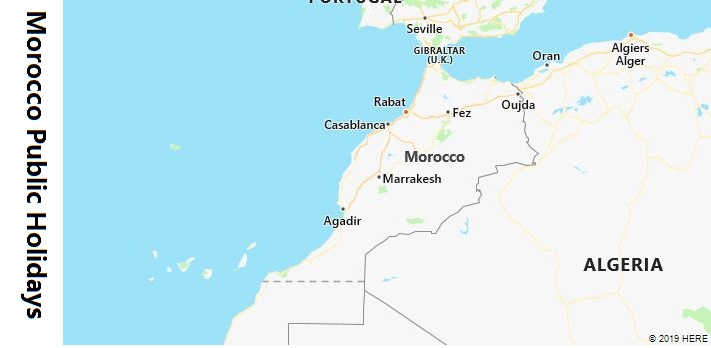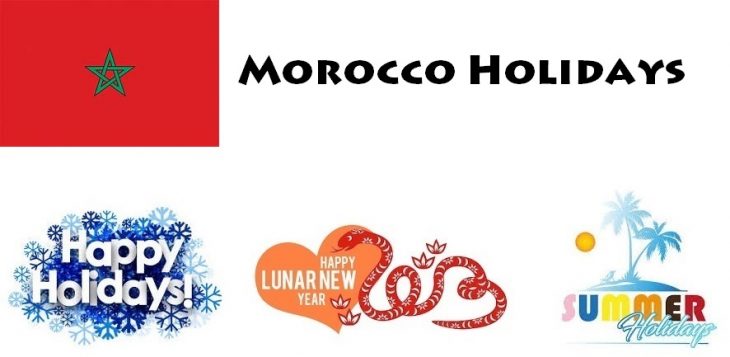Morocco Holidays
Morocco Public Holidays
Searching for the national holidays in Morocco? All public holidays in Morocco are treated like Sundays. This means that most of the Morocco employees have a day off and all schools are closed on these office holidays. If you are planning a trip to Morocco and want to know what the national and regional holidays are, check the details in the tables below.
List of Official Holidays in Morocco for Year 2020
| # | Date | Holiday | Day |
| 1 | January 01, 2020 | New Year’s Day | Wednesday |
| 2 | January 11, 2020 | Proclamation of Independence | Saturday |
| 3 | May 01, 2020 | Labour Day | Friday |
| 4 | May 24, 2020 | Eid Sghir | Sunday |
| 5 | May 25, 2020 | Eid Sghir Holiday | Monday |
| 6 | July 30, 2020 | Enthronement | Thursday |
| 7 | July 31, 2020 | Eid Kbir | Friday |
| 8 | August 01, 2020 | Eid Kbir | Saturday |
| 9 | August 14, 2020 | Oued Ed-Dahab Day | Friday |
| 10 | August 20, 2020 | Revolution Day | Thursday |
| 11 | August 20, 2020 | Fatih Muharram | Thursday |
| 12 | August 21, 2020 | Youth Day | Friday |
| 13 | October 29, 2020 | Eid Al Mawled | Thursday |
| 14 | November 06, 2020 | Green March Day | Friday |
| 15 | November 18, 2020 | Independence Day | Wednesday |
List of Official Holidays in Morocco for Year 2021
| # | Date | Holiday | Day |
| 1 | January 01, 2021 | New Year’s Day | Friday |
| 2 | January 11, 2021 | Proclamation of Independence | Monday |
| 3 | May 01, 2021 | Labour Day | Saturday |
| 4 | May 13, 2021 | Eid Sghir | Thursday |
| 5 | May 14, 2021 | Eid Sghir Holiday | Friday |
| 6 | May 15, 2021 | Eid Sghir Holiday | Saturday |
| 7 | July 20, 2021 | Eid Kbir | Tuesday |
| 8 | July 21, 2021 | Eid Kbir Holiday | Wednesday |
| 9 | July 30, 2021 | Enthronement | Friday |
| 10 | August 10, 2021 | Fatih Muharram | Tuesday |
| 11 | August 14, 2021 | Oued Ed-Dahab Day | Saturday |
| 12 | August 20, 2021 | Revolution Day | Friday |
| 13 | August 21, 2021 | Youth Day | Saturday |
| 14 | October 19, 2021 | Eid Al Mawled | Tuesday |
| 15 | November 06, 2021 | Green March Day | Saturday |
| 16 | November 18, 2021 | Independence Day | Thursday |















































